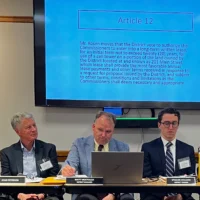This article is adapted from the website of Green Acton.
This year, there is one candidate running for the position of Commissioner of the Acton Water District (AWD): Erika Amir-Lin. This post contains Ms. Amir-Lin’s answers to questions prepared by the Green Acton Water Committee, with the goal of helping voters understand some current issues and opportunities facing the Water District, and the candidate’s thoughts on how to address them.
The Acton Water District is an independent government entity, separate from Acton’s municipal government. As such, it is led by a Board of Water Commissioners, analogous to the Acton Select Board; both serve as the executive bodies for their respective entities. The three elected Water Commissioners serve three-year terms of office. Ms. Amir-Lin was first elected to the AWD Board of Commissioners in 2018.
AWD Commissioner candidates appear on the same ballot as the candidates for Town of Acton positions. Anyone eligible to vote in Town of Acton elections can vote for AWD Commissioner; you do not need to be an AWD customer. Local Election Day this year is Tuesday, April 30. More information for voters is here.
Green Acton Water Committee prepared a set of questions for the candidate, which she answered by email. For comparison, links to the analogous Q&As from previous years can be found here. The answers have been printed verbatim as provided by the candidate, and should not be interpreted to be the positions of Green Acton or the Acton Exchange.
Q1: Please tell us about yourself and why you are a good choice to be an Acton Water District Commissioner.
I have served two terms (six years) as a Water Commissioner and I am running for my third term on the Board. During my six years on the Board, I have guided some of our most high-profile projects, including the District’s initial and ongoing response to per- and polyfluoroalkyl substances (PFAS), our significant investments in new treatment and distribution infrastructure, commissioning of our new solar arrays, and the development of bedrock wells at 549 Main Street and subsequent purchase to protect Acton’s drinking water. I’ve also had many wonderful opportunities to meet with Acton residents, such as at the Acton-Boxborough Farmers Market, and hear directly from people about what they value and worry about when it comes to their water. I enjoy serving with my two fellow Commissioners, and have good working relationships with the District staff. In my professional life, I work as a hydrogeologist and I have spent my entire twenty-year career working in the earth sciences, including many years on water supply projects. I love being able to contribute to civic life in Acton by applying my experience and skills to the goals and projects of the Acton Water District. I live in north Acton and have lived in town for eleven years. I also volunteer as president of the board of the Nagog Treatment Facility in North Acton, my neighborhood’s wastewater treatment plant, and am proud to be able to safeguard our water resources from beginning to end.
Q2: What do you think are likely to be the biggest challenges that the Water District will be facing in the next three years, and how do you think the District should tackle those challenges?
The biggest challenges are the ones we have already begun to engage with: the ever-changing regulatory environment around PFAS and other emerging contaminants, upgrading and replacing our aging distribution infrastructure, complying with the revised lead and copper rule, evaluation of long-term options for water supply and choosing a direction to move in, and continuing to navigate the ever-increasing costs of treating and supplying safe and reliable water. As we are already actively dealing with and addressing these issues, we will continue to be proactive in staying abreast of regulatory changes including engaging with legislative advocacy, allocating District funds preferentially, pursuing all available sources of outside funding, and working with local and regional towns to stay informed of how municipalities across the state are meeting these challenges and may work together to address them. The District is always working to balance a high level of engagement with the community against the limited time and resources available, given the multitude of issues the District is addressing. We also face the same ongoing pressures challenging all water systems and communities: increased costs, competition for contractors, materials, funding and consultants, and staffing challenges. As a Commissioner, my professional experience with and understanding of the water industry mean I am uniquely able to support the District as it manages these challenges.
Q3: Compared to surrounding towns, Acton has a relatively high fraction of its population who are renters rather than homeowners. The landlord is the AWD customer, and the tenants are one step removed from the AWD. For rental properties, how can the AWD encourage water conservation and ensure that tenants are well informed about water issues?
Tenants have very little control over what kind of fixtures and appliances are in their units, and may not even be able to change out their shower heads. We strongly encourage landlords to replace aging bathroom and kitchen fixtures. Toilets, in particular, can use large amounts of water, so replacing a toilet can lower water bills by quite a bit, especially if that toilet was leaky. Landlords are able to take advantage of the water-saving fixture rebates that the District offers and District staff work with management companies to identify potential leaks and find solutions to improve efficiency and prevent waste. The District has had good conversations with apartment residents at public events, and we will continue to have those conversations as we refocus our public engagement activities in the coming year. Important notices, such as PFAS updates, are distributed through multiple channels including property owners, but not exclusively, and tenants are able to sign up for our email list. The bottled water rebates for the PFAS-sensitive subpopulation have been provided to renters and based on participation, we know users of the water that do not receive a water bill are hearing our messages. Finally, one of the District’s strong points is the ability of any water user to reach out to the District and receive a high level of customer service. I have personally witnessed District staff interact with renters about concerns that the management company has been dismissive about, and staff is taking time to assist in these situations.
Q4: In the coming years, the Acton Water District and the people of Acton may face a difficult decision about whether or not to join the Metropolitan Water Resources Authority (MWRA). What do you think would be a good process for arriving at such a decision?
As approved by our voters at the Annual Meeting, the District will be hiring a consultant to complete a water supply alternatives study for us. This study will examine all possible sources of supply for the District, and evaluate the costs, challenges, and advantages of the potential options available to us now and in the future. The findings from this study will be discussed by the Commissioners and District staff, and the study findings shared with the public. We will also use these findings as part of our longer-range planning, including determining priorities for our capital expenditures, as regardless of source, we must continue to operate our distribution system. Once we understand our options for supply in the future, including the MWRA, the District will need to engage in planning discussions with the Town of Acton, regional partners, and elected officials at the state and federal levels. Engaging with the MWRA to establish more firm details about the timing and cost of joining could then proceed. The initial study by the MWRA was very broad and preliminary in nature. The next steps will evaluate the local issues, options, and process. If the District determines at that point that joining is a feasible option, we would have further public discussions and outreach on the matter and eventually bring a warrant article to a District vote or other appropriate approval as identified during the planning process. Given the magnitude of cost to move away from only producing water locally, voter approval would be needed to expend funds allowing such a change.
Q5: In the mid-1960s, the northeastern U.S. experienced a severe, extended drought. If there were to be another drought of this severity in the coming decade, how well prepared are the Acton Water District and the Acton region?
Acton is well prepared for drought. It is possible for any drought to eventually overwhelm the best possible planning, but Acton is well positioned to weather drought. Our wells draw from a number of different locations in the aquifer, and we have the ability to turn off (“rest”) wells while pumping from others. The development of the bedrock wells also helps to diversify how we are withdrawing water from the environment and is anticipated to buffer drought conditions. All of these factors help reduce stress on the aquifers. During periods of drought, water conservation is paramount. Our customers experienced an outdoor water use ban during the 2016 drought, and are accustomed to our usual outdoor water use restrictions, which are going to become permanently stricter starting this year. We would not hesitate to put long-term outdoor water use restrictions in place if needed, as demonstrated by the District’s historic use of restrictions dating to the 1980s and earlier. AWD’s conservation and efficiency programs have also been quite successful, and water use has consistently decreased year over year. This investment in year-round water savings is an important tool that many water suppliers fail to have available when drought or other water emergencies arise. Were the water levels in our wells to become too low to safely operate the pumps, we have the ability to declare a water emergency and utilize our emergency interconnections with neighboring towns. District planning initiatives and response actions are broad when it comes to the critical public health and safety mission of the District. Fortunately, the drastic actions that could be implemented in such times of crisis have been avoided and, through prudent management, the District has safely supplied the community with little interruption.
Kim Kastens is a writer, associate editor and Board member for the Acton Exchange. In addition, she chairs the Water Committee for Green Acton.



